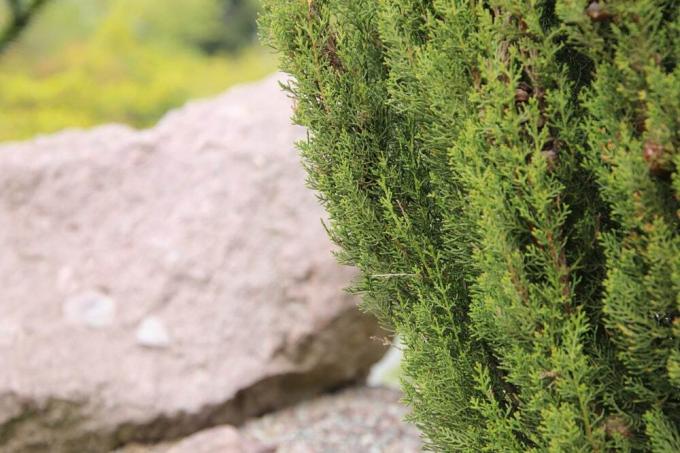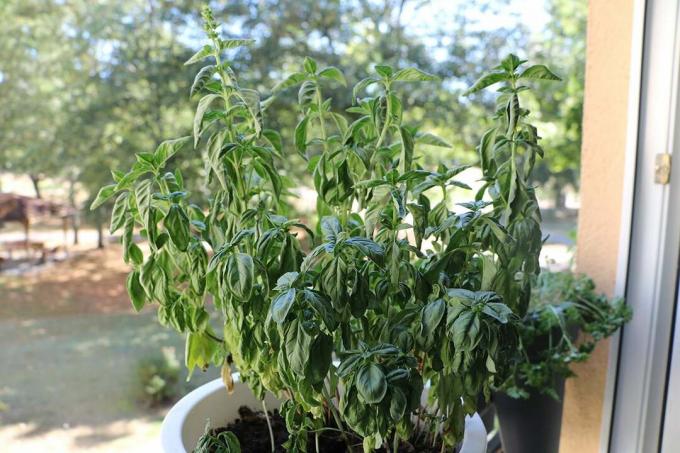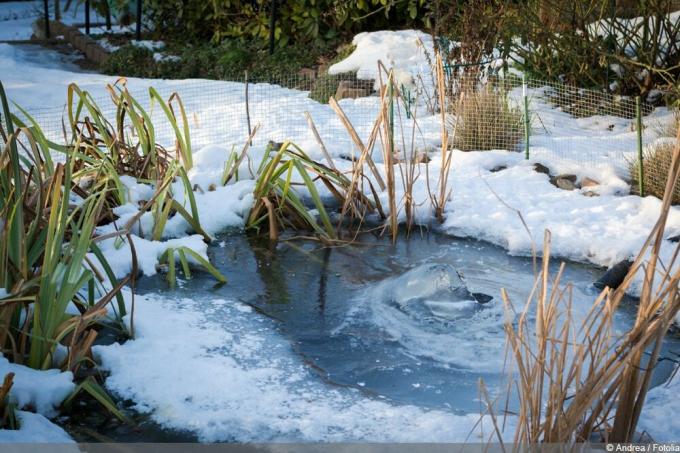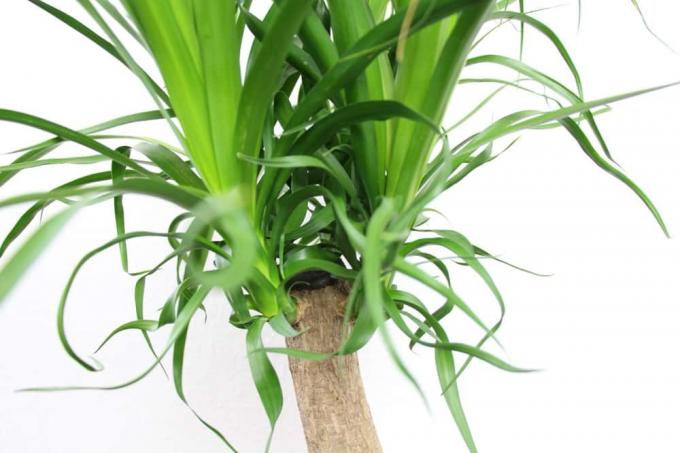

Table of contents
- Preparation
- Overwinter in the tub
- Overwinter outdoors
- care in winter
- Alternatives to cypress
The lemon cypress or cypress needs shelter and suitable conditions during the winter so as not to suffer damage from frost and snow. This is especially true for plants that are cultivated in tubs. Because although the plants are easy to care for in other areas, longer and harsher winters pose a danger to them. Our tips and hints will help to overwinter the plants without any problems.
Preparation
Cypresses need nutrients in moderation and should therefore be fertilized regularly. Suitable fertilizers include:
- Liquid fertilizer for conifers
- well rotted compost
- horn shavings
- long-term fertilizer
- Damn
Fertilization should be carried out once a year for plants standing outdoors. If the conifer is cultivated in a tub, fertilization can be done monthly or every two months. In both cases, it must be fertilized in spring if possible, but no later than September. Because too late fertilization prevents the plants from being able to prepare sufficiently for the winter.
In addition to the sufficient supply of nutrients and the right time for fertilization, further preparation also includes choosing the right location for the plants. Because in addition to frost, cold wind can also weaken the plants and cause damage.
Tip:
In the fall, broken or dead branches should also be removed. As these increase the risk of disease and rot.
Overwinter in the tub
Cypresses in buckets are not hardy. Both the roots and the above-ground parts of the plant are damaged very quickly in sub-zero temperatures. The following points are therefore important:
- frost-free place with temperatures between five and ten degrees
- choose a location that is as bright as possible
- If the soil is very cold, insulate the bottom of the bucket
- Do not let the soil dry out completely and avoid waterlogging
Tip:
If there is not enough space with the right conditions, the plants can also be overwintered professionally in a nursery or tree nursery with an appropriate offer.
Overwinter outdoors
If the lemon cypress is outdoors and has been planted here as a privacy hedge, for example, overwintering indoors is of course not possible. Appropriate protective measures must therefore be taken. On the one hand, this involves covering the tree discs. Suitable materials include:
- garden fleece
- jute or burlap
- mulch
- straw
Applied as a thick layer, they protect the floor and have a slightly insulating effect. To protect them from strong, cold winds, the plants can also be wrapped in burlap, jute or garden fleece. However, this should only be done if it is necessary due to persistent, low sub-zero temperatures. Because even in winter, the plants need sufficient light.
Even with this protection, the Mediterranean conifers are only partially hardy. If temperatures are below -15°C for a long period of time, they will still be damaged. Therefore, before selecting the plants, it should be checked whether they are really suitable for the region or whether an alternative, such as the cypress, would be a better choice.
care in winter
Light and suitable temperatures are two decisive factors for the successful overwintering of the cypress. In addition, however, care must be taken to ensure that there is an adequate supply of water. It is important here that both drying out of the substrate and waterlogging are avoided. When cultured in a bucket, this is comparatively easy. You only have to check once a week whether the soil is still slightly damp and there is no water on the bottom of the pot.

The plants that have been planted outdoors require a little more effort. Soil checks should also be carried out to ensure adequate water supply. Since the conifers can take care of themselves better due to their larger root mass and significantly more substrate storage of moisture, a check every two to three weeks is sufficient in dry winters completely off. For this purpose, however, the protective cover layer on the tree grates must be selectively removed.
If the soil seems very dry, it can be watered lightly on frost-free days. Only small amounts of water are required in each case. In winters with regular rain or snow, however, this measure is not necessary, as sufficient liquid gets into the soil.
Alternatives to cypress
If the region's climate predicts longer and harsher winters, cypress is not the best choice for outdoor planting. However, there are a few alternatives available for this. For example:
tub culture
A privacy screen can also be created with cypresses in tub culture, for example. However, the maintenance effort is increased due to more frequent watering, fertilizing and the necessary repotting. But they can be overwintered comparatively easily. In addition, they can be blended in spring and late summer from August and thus kept compact in size.
false cypress
Also known as Chamaecyparis, the cypress is another alternative. It looks similar to the Mediterranean conifers and is available in different colors and shapes. Since it has a greater frost hardiness, it is better suited to overwintering outdoors - even in regions with a harsher climate.
Thuja
The so-called tree of life is a popular garden plant, easy to care for and resistant. Like cypresses, however, the plants are poisonous, which should be considered when choosing, especially if children or pets are playing in the garden.
Virginia Rocket Juniper
In botanical terminology, the plant is called Juniperus virginiana and its growth habit is very similar to that of the cypress. However, it is much more robust against frost.
Willow-leaved Pear
This rather unknown plant is a plant that looks just as Mediterranean as the cypress. However, the foliage is more reminiscent of that of the olive trees. In addition to the robust winter hardiness, the willow-leaved pears also offer edible fruit and can be cultivated as a columnar fruit, so that they resemble cypresses in shape.
 garden editorial
garden editorial I write about everything that interests me in my garden.
Learn more about overwintering plants

How much frost do horned violets tolerate?
Horned violets are a popular bedding plant that survives the winter. They are planted either in spring or in autumn and overwinter in the beds. They usually do without frost protection, which is why they are also often used as easy-care plants for graves.

Is the dragon tree hardy? 7 tips for wintering
Dracaena, the botanical name of the dragon tree, is not just coincidentally reminiscent of a palm tree. Like the palm trees, it also likes it warm and sunny. He is not hardy and has to hibernate in the house. Here are some tips.

Are asters hardy? 5 tips for wintering
The summer aster and the autumn aster not only differ in their flowering time. When winter arrives, another difference becomes apparent: one dies, the other survives the frost.

Overwintering basil: 7 tips for caring for it in winter
If you want to enjoy fresh basil in winter, you can overwinter it with a little skill. With these 7 tips you will definitely succeed!

Overwintering pond plants | Aquatic plants in winter
The garden pond is an important design element in the garden for many hobby gardeners. With the right pond plants, it draws everyone's attention. The numerous species differ in their appearance, their planting location on or in the pond and, last but not least, their winter hardiness.

Overwintering Yucca Palm - Is It Hardy?
Although yucca palms are indoor plants, they like to be outdoors in the summer. However, most species are not hardy. It is necessary to winter them indoors. You can find out how to do this here.
